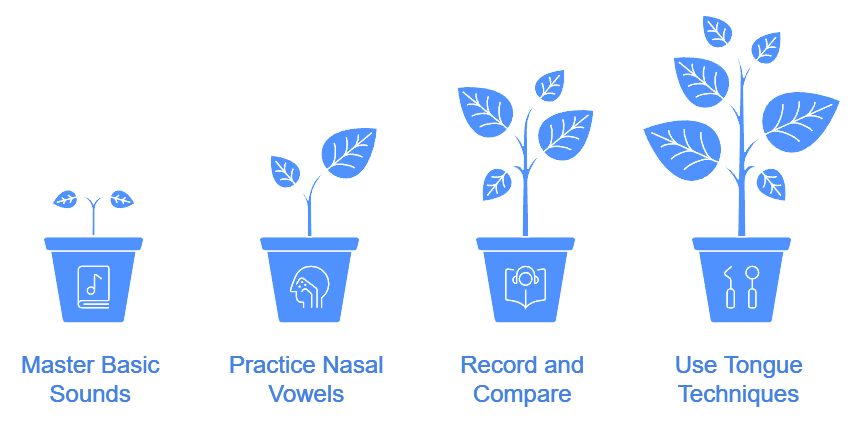How to Improve Speaking Skills in French: A Complete Guide for Language Learners
Improving your French speaking skills requires a mix of daily practice, smart learning strategies, and cultural understanding. This guide will show you proven methods to enhance your French speaking abilities, whether you’re a beginner or looking to reach advanced fluency.
Key Takeaways
- Practice speaking French daily, even if just for 15 minutes
- Use technology and AI tools to track your progress
- Combine traditional learning with cultural immersion
- Focus on pronunciation from the start
- Track your progress with specific metrics
- Address psychological barriers early
Understanding Your Starting Point
Before diving into practice, you need to know where you stand. Many learners skip this crucial step, but it’s essential for tracking your progress. Take a moment to assess your current level using the CEFR (Common European Framework of Reference) guidelines.
Self-Assessment Table:
| Level | Speaking Ability | Daily Tasks You Can Do |
|---|---|---|
| A1 (Beginner) | Basic phrases | Order coffee, say hello |
| A2 (Elementary) | Simple conversations | Give basic directions |
| B1 (Intermediate) | Express opinions | Discuss familiar topics |
| B2 (Upper Intermediate) | Fluid conversation | Debate current events |
| C1 (Advanced) | Complex discussion | Professional meetings |
| C2 (Mastery) | Native-like fluency | Any context |
Core Speaking Enhancement Strategies
Daily Practice Routines
Start with these proven techniques that many successful learners use:
- Talk to yourself in French while doing daily tasks
- Record your voice and analyze your pronunciation
- Practice with French podcasts using the shadowing technique
- Join online conversation groups for regular practice
Pro Tip: Set aside specific times for practice. Even 15 minutes of focused practice is better than an hour of passive learning.
Pronunciation Mastery
French pronunciation can be tricky, but it’s crucial for being understood. Here’s a systematic approach:
- Master the basic sounds using IPA (International Phonetic Alphabet)
- Practice nasal vowels daily
- Record yourself speaking and compare with native speakers
- Use tongue twisters for specific sound practice

Digital Learning Integration
Modern technology offers powerful tools for language learning. Here’s how to use them effectively:
Recommended AI Tools and Apps:
- Speech recognition software for pronunciation feedback
- Virtual reality conversation platforms
- Language exchange apps for real practice
- Progress tracking applications
Virtual Immersion Techniques
Create a French-speaking environment without leaving home:
- Change your phone’s language to French
- Watch French YouTube channels with subtitles
- Join virtual French conversation groups
- Use social media in French
Cultural Integration for Better Speaking
Understanding French culture dramatically improves your speaking ability. Here’s why:
- Regional Variations Matter French is spoken differently across regions. Learn about:
- Québécois French differences
- African French variations
- Swiss and Belgian French nuances
- Business French Essentials For professional settings, focus on:
- Formal address forms
- Meeting etiquette
- Email communication styles
Psychological Barriers and Solutions
Many learners face mental blocks that hinder progress. Here’s how to overcome them:
Common Barriers and Solutions:
| Barrier | Solution | Implementation |
|---|---|---|
| Speaking Anxiety | Start with short exchanges | Practice ordering coffee |
| Fear of Mistakes | Embrace errors as learning tools | Keep an error journal |
| Perfectionism | Focus on communication | Set realistic daily goals |
| Plateau Frustration | Vary learning methods | Try new conversation topics |
Progress Tracking Methods
Track your improvement using these metrics:
- Words spoken per minute
- New vocabulary used daily
- Conversation duration
- Native speaker comprehension rate
Weekly Progress Template:
- Record a 2-minute speech
- Count words spoken fluently
- Note new expressions used
- Track conversation length with natives
- Rate your confidence level (1-10)
Advanced Speaking Techniques
Once you’ve mastered the basics, try these advanced methods:
Shadowing Practice:
- Choose a native speaker audio
- Listen actively
- Repeat immediately after
- Match intonation and rhythm
- Practice daily for 10 minutes
Practical Application
Put your skills to use in real situations:
Daily Practice Scenarios:
- Order at restaurants
- Give directions
- Discuss current events
- Share opinions on films
- Describe your day
Remember, improving your French speaking skills is a journey, not a destination. Focus on progress, not perfection, and celebrate small wins along the way. With consistent practice using these methods, you’ll notice improvement in your French speaking abilities within weeks.
Start today by choosing one technique from this guide and implementing it in your daily routine. Which method will you try first?
